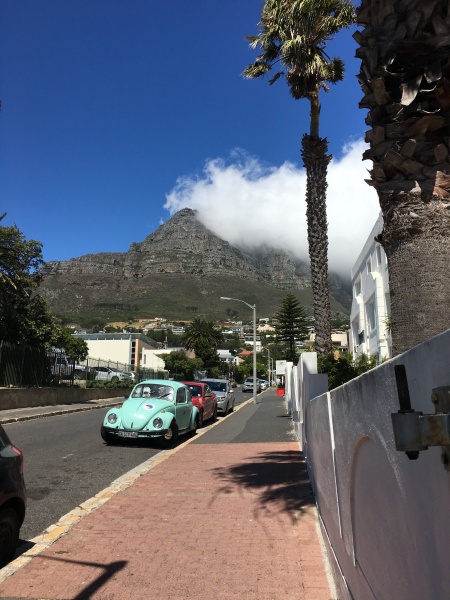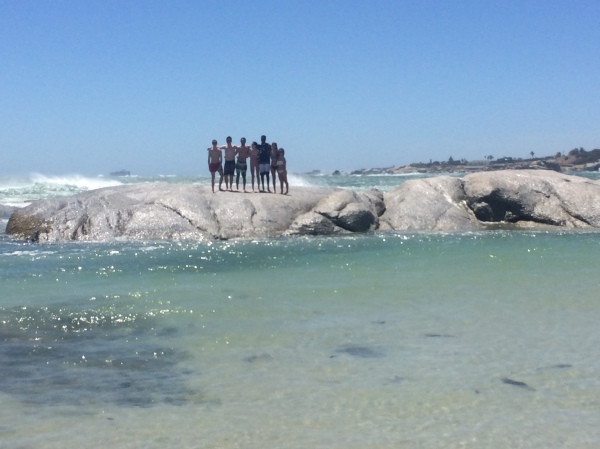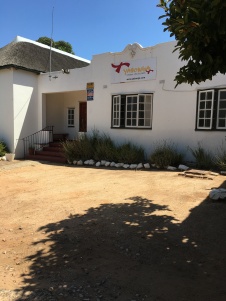Where the Mountains Meet the Sea
I cannot stop sweating, my skin is sunburnt, my feet haven’t been clean since I arrived, I have given up trying to control my hair, the internet never seems to work, and the house I live in is infested with cockroaches. Also, I would not change one single thing. Africa is beautiful. Cape Town makes me feel excited and alive.
So much has happened here in such a short amount of time.
First and foremost, I’m happy to announce I have made 19 new wonderful best friends. I came into this experience thinking I would generally enjoy everyone, knowing that a person who decides to get involved with this type of program must be someone I could find something in common with; I had no idea how quickly friendships among the group would form, nor how deep they could get within a period of 72 hours.
In many of our conversations, the general consensus has been that this dynamic is great. I know things may change as time passes. Perhaps people will start developing closer ties with specific members of the group, but no matter how things develop, I know I am in great company and I feel blessed to be with them all.
In fact, one of my beautiful new friends, Kristen, just came over as I was writing this. We were, again, talking about the great group dynamic and she mentioned this: “it’s impossible to feel homesick here because any room you walk in, you can start having the most wonderful conversation with anyone.” Kristen is entirely correct in that sentiment- this group just clicks. Everyone is passionate, everyone is kind, everyone laughs easily and is genuinely interested in getting to know each other.
Oh, and to top it off- people here read! It’s so comforting to find a group of 20 year olds who are interested in intellectually stimulating activities. This place is magical, I swear.
On Sunday the whole group travelled to Camps Bay to go to the beach. It was so wonderful to feel the sun on my skin again. The beaches here are gorgeous, as so many beaches all over the world are. These beaches are special because they are a place where the stunning landscape of Cape Town’s mountains (specifically Table Mountain and Devil’s Peak) is the backdrop of the sparkling sea.

The whole group took pictures and went swimming in the ocean- some of us did get yelled at once for trying to climb on the rocks during high tide, but the authorities didn’t seem to mind too much- they probably assumed we were tourists who didn’t know better.
 the quality of the photo is awful- the opposite can be said for quality of the subjects and photographer.
the quality of the photo is awful- the opposite can be said for quality of the subjects and photographer.
Yesterday we watched the 10th anniversary video for the South Africa Service Learning program as a group. We talked about what we are getting ourselves involved with, and our director Melikaya emphasized that no matter what we do here, that we ensure this experience is our own experience, that it cannot and should not fall subject to replicate other’s expectations or previous member’s outcomes. I have included the link for the video here: http://www.youtube.com/watch?v=UpOTI-Az3qQ
I was lucky to able to visit my service site yesterday. I was placed at Yabonga, an NGO that serves women, children, and youth either infected with or affected by HIV/AIDS. In preparing for this trip, I was hopeful I would be placed in an organization where I could use my interest in sexual health as a platform for my service here. I could not have asked for a better placement.
Yabunga’s main offices are beautiful. While most of the services they provide happen in 9 surrounding townships in the Cape Town area. They recruit most of their staff from within the communities they are hoping to impact, and receive referrals primarily from the clinics within the townships. If I remember correctly, they have been around for 18 years, employ about 100 people, and have teams in the US, Austria, Switzerland, the UK, and Germany to raise their funds.
Yabonga first started working with women in 1998 who were infected with HIV/AIDS. They soon realized the need to support the children who were either infected by HIV or had parents who were. Those children grew up, and Yabonga continued to support them as they became youth.
The staff works to provide accurate health information in clinics, community mothers from the specific townships cook and care for the program’s children in their own homes, counselors who are trained in play therapy, engages the youth and follows through on the necessary administrative paperwork . They also have their own garden and bakery so they can create and provide nutritious food to the people in the community they serve. We were able to tour the grounds and the garden and bakery added an enchanting and importantly sustainable element to the NGO.
The truly empowering component of the Yabonga model is they recruit from the community, and additionally, most of their field staff has been a client in the past.Recruiting from same the townships they work within allows the services allows Yabonga to give communities the means to empower themselves. The administrative staff recognizes that it’s a completely different experience to hear information about HIV/AIDS from a person living with a positive status from your own township, than to hear about it solely from someone like me- a white, privileged outsider who has not been exposed to HIV.
I worried about the “white savior complex” coming into this program. I am generally aware of the impact of my own privilege, and I feared that I might have been put in a position where I would have to engage in a sort of “Voluntourism” where my service would take away from employing the local people who could empower their own communities. The Yabonga model alleviated these fears. There are specific tasks, both administrative and in support of the existing staff I will be able to participate in
Once I begin my service work I will add more details. For now, here’s a photo of the site.
An important side-note: after visiting Yabonga, we visited one of the other service sites called Christine Revell Children’s Home. The organization houses 49 children, from infancy to 5 years old. Of course, as the baby obsessed person I am, going to Christine Revell was a treat. Babies make my heart glow. I may or may not have picked one up while we were on our tour. (In case that wasn’t obvious, I definitely did pick up a small child, and it was one of the highlights of my day and the first thing I came back and told the group).
It’s funny I’ve only been here three days and already it seems as if I’ve been here for weeks. I can talk to anyone about anything and I feel safe. I feel like these people get me.
Today was another beautiful day. I’ll post details later.
-J
